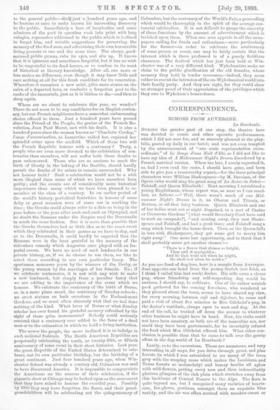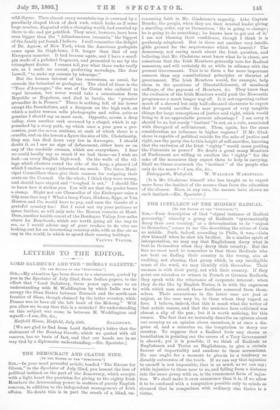CORRESPONDENCE.
ECHOES FROM AUVERGNE.
La Bourboule. Duanse the greater part of our stay, the theatre here• was devoted to comic and other operatic performances, which I did not care for, and so scarcely glanced at the play- bills, posted up daily in our hotel; and was not even tempted by the announcement of " une seule representation extra- ordinaire " of Le Songs d'une Nuit d'Etel, as I did not like to• have my idea of A Midsummer Night's Dream disordered by a. French metrical version. When too late, I sorely regretted it, as, had I even read the caste, I should have gone, and been able to give you a trustworthy report,—for the three principal characters were William Shakespeare—by M. Dereims, of the Opera (who would sing his great song of La Beine de Saba)— Falstaff, and Queen Elizabeth ! Next morning I catechised a young Englishman, whose report was, as near as I can recol- lect, as follows :—" Well, there wasn't much of our Mid- summer Night's Dream in it, no Oberon and Titania, or Bottom, or all that fairy business. Qinaen Elizabeth and one of her ladies went out at night disguised, to a sort of Casino, or Cremorne Gardens" [what would Secretary Cecil have said to such an escapade !], "and coming away, they met Shake- speare and Falstaff, and had a good time; and Falstaff sang a song which brought the house down. Then, as the Queen falls in love with Shakespeare, they get some girl to marry him right away." One more lost opportunity, and to think that I, shall probably never get another chance !— " There is a flower that shins so bright, They call it marigold-a : And ho that wold not when he might, He shall not when he wold-a."
As you are fond of dog-lore, here is a sample from Auvergne. Just opposite our hotel lives the young Scotch (not Irish, as I think I called him last week) doctor. His wife owns a clever pug, whose friendship any self-respecting dog would be anxious, I should say, to cultivate. One of the rather scratch, pack gathered for the coming fox-chase, who wandered as they pleased about the town, seems to have shared my view,. for every morning, between cafe and dejeiner, he came and paid a visit of about five minutes to Mrs. Gilchrist's pug, in the doctor's vestibule, always open to man and dog. At the end of his call, he trotted off down the avenue to whatever other business he might have in hand. Now, his visits could^ not have been amatory, as both are of the masculine sex, nor.
could they have been gastronomic, for he invariably refused the food which Mrs. Gilchrist offered him. What other con- clusion is possible than that be came to talk over the gossip, afloat in the dog-world of La Bourboule Lastly, as to the excursions. These are numerous, and very interesting in all ways, for you drive through great, sad pine forests (in which I was astonished to see many of the trees, grey with the weeping moss which makes the Louisiana and Texas forests so melancholy) and breezy heaths all aglow with wild-flowers, getting every now and then indescribably glorious glimpses of the rich plain which stretches away from this backbone of Central France to the Alps. The flora is quite beyond me, but I recognised many varieties of hearts- ease, fox-gloves, gentians, amongst them an exquisite blue variety, and the air was often scented with meadow-sweet or wild-thyme. Then almost every mountain-top is crowned by a peculiarly shaped block of dark rook, which looks as if some huge saurian, disgusted with a changing world, had crawled up there to die and get petrified. They must, however, have been even bigger than the " Atlantosaurus immanis," the biggest of the family yet found, I believe. I well remember the delight of Dr. Agnew, of New York, when the American geologists came upon its thigh-bone, 2 ft. longer than that of any European monster. It had become agate, and I have a scarf- pin made of a polished fragment, and presented to me by the triumphant doctor. I cannot tell you what these rocks really are, as I made no ascent•, preferring nowadays, like dear Lowell, "to make my ascents by telescope."
But the human interest of the excursions, as usual, far -exceeds the botanical or geological. The chief of these is the -" Tour d'Auvergne," the seat of the Count who enlisted to repel invasion, but never would take a commission from Republic or Napoleon, and died in battle, the "premier grenadier de la France." There is nothing left of his tower except the foundations, and a dungeon on the high rock, on which a native woman sells photographs and relics, quite as genuine I should say as most such. Opposite, across a deep valley, rises another rock crowned by a chapel, which is ap- proached by a steep path, up which once a year goes a pro- cession, past the seven stations, at each of which there is a crucifix, and on the lowest a figure the size of life. Christianity, they say, has died down very low in Auvergne. I should doubt it, as I saw no sign of defacement, either here or on any of the roadside crosses, which are everywhere. I fear we could hardly say as much if we had them—as I wish we had—on every English high-road. On the walls of the vil- lage which clusters round the side of the keep, a placard (of which I enclose a copy) interested me much. The three Muni- cipal Councillors there give their reasons for resigning their seats on the Council. On the whole, I think they were wrong, and should have stayed and " toughed it out." I should like to know how it strikes you. You will see that the poster bears a stamp. Might not our Chancellor of the Exchequer raise a 'tidy sum that way ? What a lump Pears, Hudson, Epps, or Van Houten and Co. would have to pay, and earn the thanks of a grateful country too But I must not try your patience or -space further, so will only note the Roman remains at Mont- Dore, another health-resort of the Dordogne Valley, four miles above La Bourboule, which are worth going all the way to see, as I would advise any of your• readers to do who are looking-out for an interesting country-side, with as fine air as any in the world, in which to spend their coming holidays.
VACLTUS VIATOR.



































 Previous page
Previous page